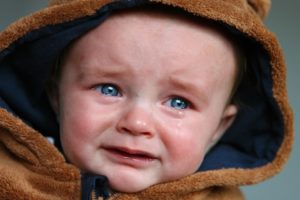Caring for a baby goes beyond breastfeeding, hygiene, sleep routine, and vaccinations. Health is the result of everything working together. Mild colds and strong flu can happen along the way and are easily treated, but when a baby has pneumonia and needs rigorous care, what should you do?
What is Pneumonia?
Pneumonia is an infection that occurs in the lungs and is usually accompanied by a cough with phlegm. However, there are cases where it can appear without any symptoms such as coughing1. Besides the cough, shortness of breath and constant fever are other common symptoms of pneumonia.
Causes of Pneumonia in Babies
The disease is caused by the entry of an infectious agent (virus, bacteria, fungi) into the bronchi. That’s why it is extremely important to always keep the environment ventilated, with air circulation and cleanliness, preventing stagnant air from contaminating more people. One of the biggest risk factors for babies developing pneumonia are episodes of flu and colds. Lack of breastfeeding and premature birth also make babies more susceptible. Lack of vaccination and close contact with sick adults can further increase the risks. Babies who have already had pneumonia are more likely to get it again, so all care is necessary.
Main Symptoms of Pneumonia in Babies
One of the symptoms of pneumonia in babies is visual, since they do not know how to speak yet2. They are usually more “lethargic” and less active than usual. Signs such as fever at first, small noises in the lungs, and loss of appetite can be observed. When the baby has intense coughing episodes, vomiting can occur due to mucus. Respiratory difficulty, especially during sleep, can also be noticed.
Diagnosis of Pneumonia in Babies
Pneumonia should be taken seriously because if not treated properly, it can pose serious health risks, even death. During a visit to the pediatrician, if pneumonia is suspected, a chest x-ray and a blood count will be requested. Through exams, it will be possible to determine the severity of the baby’s pneumonia and the recommended treatment in each case. The sooner it is done and treatment started, the sooner improvement will occur and the less risk there will be of complications.
Caring for the Baby
Caring for the baby is essential to maintain their health. Keeping the baby well hydrated, and breastfeeding on demand if the baby is nursed, serves this function. Keep the baby away from cigarette smoke and other pollutants. Avoid the use of cleaning products with strong odors in the area where the baby stays and keep the place clean and ventilated, ensuring good air circulation. Also, as we know, pneumonia is a contagious disease that can be transmitted through respiratory droplets or when the baby coughs or sneezes. For this reason, babies who attend daycare or nurseries can easily catch it from other children. 
Treatment for Pneumonia in Babies
The treatment of pneumonia is not complicated, it just requires the right care and the correct antibiotics prescribed by the pediatrician, as well as some tips that should not be overlooked3. If the pneumonia is more severe, the doctor will not prescribe medications, but rather hospital admission; when the baby has high fever or shows clinical changes caused by the pneumonia itself, there is a chance for hospitalization, especially since medication administered directly into the vein produces even quicker results. The recommendation is to keep the baby well hydrated, use nebulizers, and use the antibiotics prescribed by the pediatrician, which need to be adjusted for both dose and age. There are also other tips to support the treatment and promote a quicker, healthier recovery:
- Dress babies and small children appropriately for each season;
- As they tend to kick off blankets while sleeping, invest in warm pajamas;
- While bathing, close doors and windows to avoid drafts;
- Don’t let babies sleep with wet hair;
- Be careful with the air conditioning at home and in the car; exposing babies to sudden temperature changes is dangerous;
- Extra care should be taken during cold weather when respiratory infections are more frequent than usual.
- Avoid taking babies to crowded and enclosed places, which increases the risk of transmission of the pneumonia-causing virus;
- Immunize the baby with the flu vaccine;
- Of course, even with all the described care and all parental precautions, there are still chances of pneumonia in babies. However, if we can reduce the chances by following certain precautions, we should do so.
Of course, even with all the described care and all parental precautions, there are still chances of pneumonia in babies. However, if we can reduce the chances by following certain precautions, we should do so.











